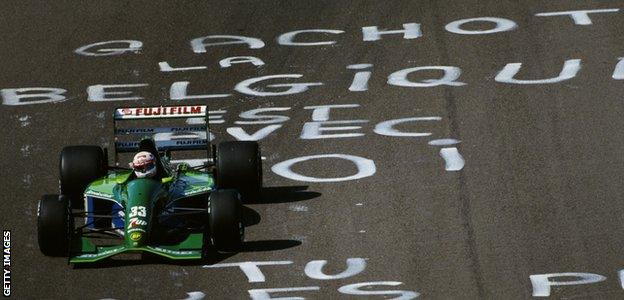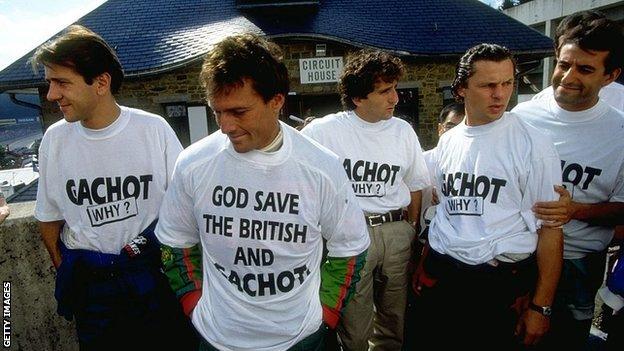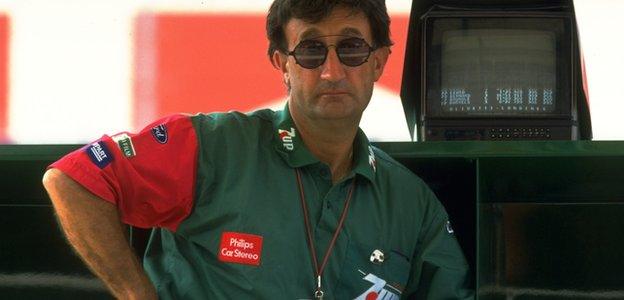Tear gas, prison & Eddie Jordan: how Michael Schumacher got his big break
- Published
Archive: Michael Schumacher: The story of his F1 debut
This story was first published on 25 August, 2016.
What do a London taxi, a can of CS gas and a promising young Formula 1 driver called Bertrand Gachot have in common?
They all played a small, but potentially significant, part in Michael Schumacher becoming one of the greatest drivers of all time.
"I was the guy in the wrong place at the wrong time that gave Schumacher the chance to shine," Gachot told BBC Radio 5 live.
It is 30 years ago this week that the Frenchman was involved in a incident that ultimately changed the course of racing history.

Protestors angry at Gachot's plight - all attributed to a can of CS gas - covered sections of the Spa track in graffiti at the 1991 Belgian Grand Prix. Presumably they used brushes instead of cans?
Back then, Gachot was an impressive young driver for the recently formed Jordan Grand Prix team. He had caught the eye with a number of top-10 finishes in the first half of the 1991 season, as well as winning the Le Mans 24 Hours race.
However, just two days after setting the fastest lap at the Hungarian Grand Prix, he was in court.
Earlier that year, Gachot had been involved in a minor accident with a London taxi. An argument with the driver ensued, with Gachot producing a can of CS gas and spraying it in his face.
"I really didn't think it was an issue," said Gachot, now 58.
"We are talking about something that was really petty and basically I defended myself using tear gas.
"I thought this was what you were supposed to do and never knew it was considered a weapon. I really felt I was within my rights and didn't do anything wrong."

Gachot - why? Because he sprayed tear gas in a taxi driver's face
At the time, CS gas was illegal in Britain - but Gachot did not realise the gravity of the situation. He expected a fine and a couple of days in prison at the most. Instead he was sentenced to six months.
"I had no idea that my freedom was at stake," he said.
"Once I was in the prison I thought I would spend the weekend there but then my lawyer came in on the Monday and said it would be months."
It ended up being two months, with Gachot's original sentence reduced on appeal.
However, it was long enough to leave Jordan's team owner Eddie Jordan needing a driver to fill his seat on a temporary basis. That driver was Schumacher.
"Someone at the prison told me that the team had taken a German and they didn't need me any more," said Gachot.
"Every time he came in front of my cell he made the noise of a Formula 1 car, telling me that this driver was very good and they didn't need me."
Gachot's tormentor may have been teasing, but Schumacher was certainly making an impression.
How Michael Schumacher got his big break with Jordan
On his F1 debut, the then 22-year-old produced a stunning display to secure seventh on the grid for Jordan.
A problem with his car would result in Schumacher failing to finish the race itself, but his performance in qualifying had done enough to convince those at Jordan that they had a real talent on their hands.
It had also impressed other teams, and Benetton moved quickly to secure his services. From then on, his rise to F1 dominance was rapid, with the first of his seven world titles coming in 1994.
By the time Gachot had been released from prison, he had missed four grands prix and his seat at Jordan had been filled by Alex Zanardi.
He ended up with Larrousse but was unable to replicate the form he had shown in the first half of the season at Jordan.

Eddie Jordan would probably rather we hadn't dug out this picture from the 1991 season...
After a year away from the sport, Gachot had two seasons at Pacific before leaving F1 for good in 1995.
By then, Schumacher was a two-time world champion and about to embark on a career at Ferrari.
Their careers may have taken very different paths, but Gachot insists he feels no animosity towards Schumacher.
"Schumacher deserved the career he had," he added.
"It was not me that made him, he made himself, he took the opportunity and did the best with it.
"I have regrets for sure and things I could have done differently but I am at peace with it."
Listen again to BBC Radio 5 live's 'Seven Days That Changed F1', a look back at Michael Schumacher's debut in Formula 1.
Related topics
- Published18 December 2015

- Published8 August 2017

- Published13 May 2016

- Published26 February 2019
